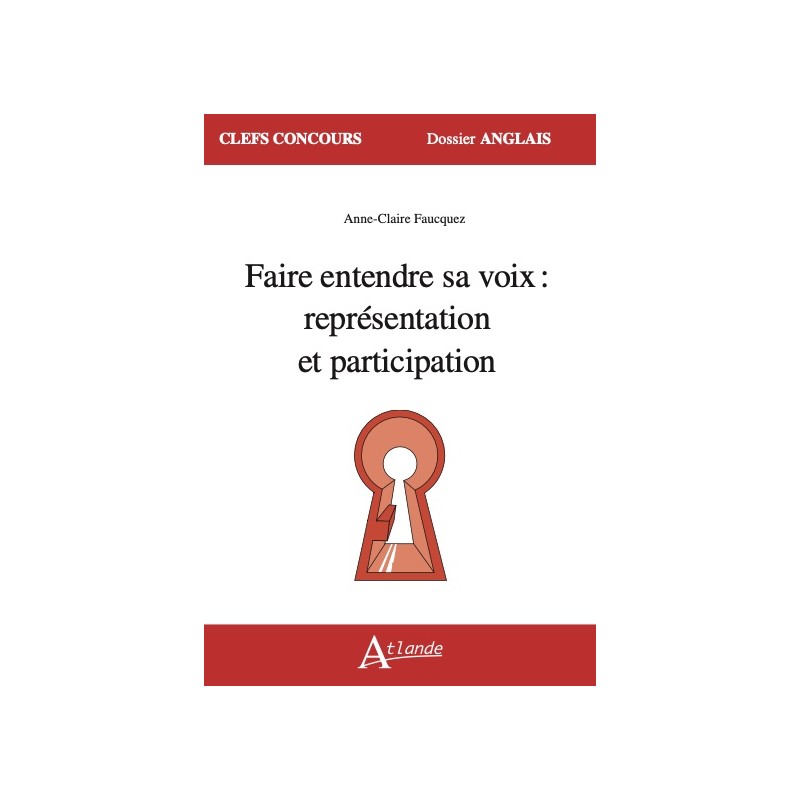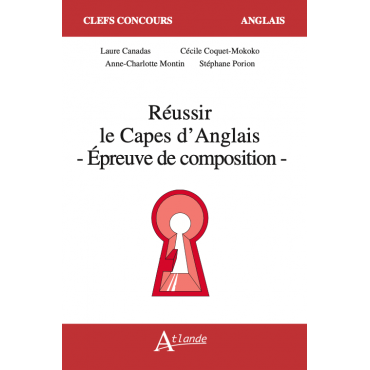



par Anne-Claire Faucquez
 Livraison en lettre suivie
Livraison en lettre suivie
France met. : 5€ ⭢ 24€ d'achat, 10€ ⭢ 48€, 15€ ⭢ 96€, 20€ au-delà. DOM-TOM : 12€, 20€, 28€, 40€
Clefs-Concours
S'adressant à tous les candidats aux concours, en particulier à l'agrégation et au Capes, Clefs-Concours offre une synthèse par sujet. Conçu comme un repère par rapport aux monographies et aux cours et comme un outil de révision, chaque ouvrage est articulé autour de fiches thématiques permettant de faire le point sur les acquis de la recherche.
Synthèse des travaux les plus récents, Clefs-Concours permet de s'orienter dans la bibliographie et de mettre en perspective l'évolution des savoirs.
Clefs concours Anglais - Dossier
Tous les titres sont organisés autour d’une structure commune :
Introduction ;
Repères sur le contexte historique et culturel ;
Thèmes qui structurent le sujet ;
Outils (bibliographie, chronologie, glossaire).
Fiche technique
Introduction :
Remarques préliminaires sur les épreuves du CAPES
Thématique 2 : “Représentations” (extrait du B.O.) 14
Axe d’étude 1 : Faire entendre sa voix :
représentation et participation 15
Thème et axe d’étude 17
Structure et intérêts du présent ouvrage 18
Enjeux et problématiques 18
Conseils méthodologiques 20
Appréhender les textes et aboutir à une problématique 21
Gérer son temps et s’appliquer à la mise en forme 24
Les attentes du jury : écueils à éviter 25
THE EMERGENCE OF THE IDEA OF DEMOCRACY
From William the Conqueror to the Glorious Revolution
Magna Carta 31
The creation of Parliament 32
The Puritan ideas during the English Civil War 34
The Glorious Revolution and Constitutional Monarchy 37
Colonial America and the American Revolution
Colonial assemblies 41
The American Revolution and the drafting of the Constitution 49
A dispersed government 56
A Federal Government 58
The Constitution 59
MODERN POLITICAL INSTITUTIONS
Britain’s parliamentary monarchy
The Uncodified Constitution 63
The monarch 66
The Prime Minister and the Cabinet 67
The Parliament 69
The United States’ federal government
The legislative branch 73
The executive branch 75
The judicial branch 79
The Commonwealth: Australia, Canada, India and South Africa
Australia 82
Canada 85
India 88
South Africa 89
POLITICAL PARTIES
Political parties versus Interest groups 95
British political parties
Whigs, Tories, Labour and Conservatives 99
Britain’s minority parties 104
American political parties
The Emergence of Political Parties (1789–1824) 109
The Second Party System (1828–1854):
the Democratic Party versus the Whigs 112
The Third Party System and the creation of the GOP
(1854–1896) 113
The Fourth Party System and the rise of Populism
(1896–1932) 115
The Fifth Party System (1933–1968)
and the New Democratic Party 117
The Sixth Party System (1968–present)
and the New Republican Party 119
Democracy in the 21st century
The demise of the two-party system? 125
The decline in voter turnout 128
The rise of populism 131
Alternative means of expression 136
Democracy in the digital age 139
TOOLBOX
Key documents
US Constitution and Amendments (summary) 147
Articles 147
Amendments: The Bill of Rights
(First ten amendments passed in 1791) 148
Additional amendments 148
“Bill of Rights” ratified December 15, 1791 150
British prime ministers since 1945 152
American presidents since 1945 153
US government checks and balances 154
Chronology of British political history 155
Chronology of American Political History 159
Bibliography
The history of political institutions and democracy 163
Primary Sources 163
Secondary Sources 164
• Articles
• Books
Political parties and contemporary politics 166
Primary Sources 166
Secondary Sources 168
• Online press articles
• Journal articles
• Books
Glossary 179
Anne-Claire Faucquez est maîtresse de conférences en civilisation américaine à l’Université Paris 8. En 2021, elle a publié aux Indes Savantes De la Nouvelle-Néerlande à New York : la naissance d’une société esclavagiste, 1624-1712, dont la version traduite en anglais est en cours de préparation et sera à paraître chez Cornell University Press. Elle travaille sur l’esclavage dans les colonies américaines, mais également sur l’écriture et l’effacement de l’histoire de l’esclavage au XIXe dans les livres d’histoire et les manuels scolaires publiés dans les États du Nord (New York, Pennsylvanie). Elle s’intéresse par ailleurs aux problématiques plus contemporaines des mises en récit de l’esclavage dans l’espace public (les monuments et les musées). Un ouvrage issu d’un colloque international qui s’est tenu en 2021 est en cours de préparation chez Liverpool University Press, intitulé The Narrativization of Slavery in European Museums: Arts and Representations.
In the mid-1230s, the word parliament came into common use to describe the meetings of the great council. It derived from the French word “parlement” that was first used in the late 11th century, meaning “parley” or “discussion meeting” (remember that William the Conqueror was a Norman, so French was widely spoken in the English Court), and was influenced by French practice as French towns had local parliaments. Parliament was the place where national affairs were debated, where the King gave his assent to law and where his request for extraordinary taxation was made (be it granted or rejected), and it also served as England’s highest court of justice. In 1258, Simon de Montfort elected a council of nobles called “parliament” which aimed at getting rid of Henry II’s foreign advisers. It was under the reign of Edward I that was created a more representative institution composed of knights (small landowners), wealthy freemen from the shires and burgesses (merchants from the towns). Edward I explained his action by saying, “What affects all, by all should be approved”. Historians refer to this famous gathering as the Model Parliament because it established a standard for later parliaments. This “popular” institution accepting non-nobles became the lower part of the House of the Parliament, the House of Commons. On the contrary, the House of Lords met separately and was exclusively composed of nobles as well as representatives of the Church, the Spiritual Nobles. Over the centuries, the House of Commons started to get an equal influence to the House of Lords thanks to its “power of the purse,” that is, its right to approve expenses. As the great majority of English people had no part in Parliament, it was not yet a truly democratic body, but its existence limited the power of the monarch and established the principle of representation. Its historical importance has been stressed in a speech given by the radical MP John Bright in 1865 describing the English Parliament as it appeared under the reign of Edward I as “the mother of Parliaments”.
